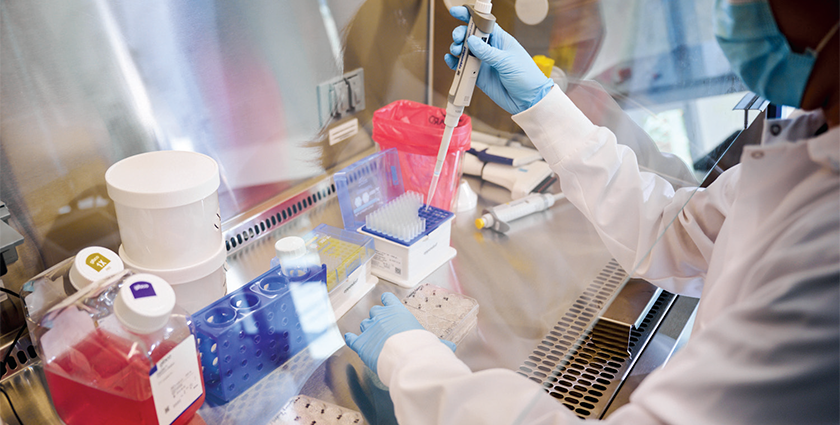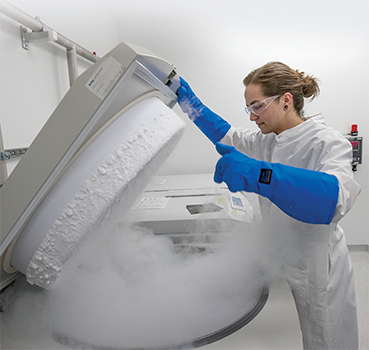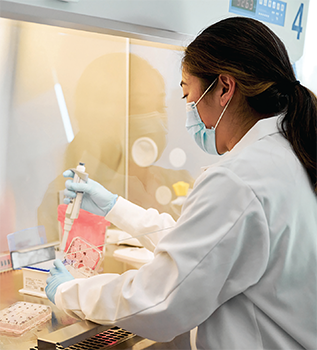
Technology-focused biomanufacturing company Resilience is pioneering a new approach to drug manufacturing, with the potential to shake up the industry
In March 2020, the reality of Covid-19 began to make itself felt in countries across the world. For governments, and for industry, the arrival of the virus initiated a race against the clock. Faced with a new and unpredictable enemy, they set to work on the production of a series of vaccines which, more than two years later, have saved countless lives across the globe.
But this progress wasn’t always a given. According to Rahul Singhvi, CEO at Resilience, a technology-focused biomanufacturing company dedicated to broadening access to complex medicines and to protecting biopharmaceutical supply chains against disruption, one of the few upsides to come from Covid-19 has been a welcome jolt to a sector that had promised much, but failed to deliver. “As biomedical science had taken off and given rise to incredible curative therapies, bio-manufacturing had failed to keep pace,” he says, speaking to Manufacturing Today. “During the pandemic, it became apparent that we needed to do something different, and better, to protect the world from biological threats.”
Founded in mid-2020 at the height of the pandemic, Resilience hopes to be that difference. The company’s vision is to revolutionize how medicines are made, funded, and scaled, working across five key ‘modalities’: biologics, cell therapy, gene therapy, nucleic acids, and vaccines. Resilience partners across these modalities with research and academic institutes, emerging biotech or established pharmaceutical companies, and governments, providing access to its state-of-the-art equipment, shared lab space, and vast team of highly specialized industry experts. Through this collaboration, the company argues that it can help such partners identify where their own emerging discoveries might lead, be it the incubation of a new therapy, drug manufacturing technology, or process improvement project.
“This is the dawn of the golden era of biomanufacturing,” Rahul tells us. “As a society, we have moved away from palliative therapies to embrace new types of medicines. These medicines have the potential to deliver cures with a single intervention, be it certain cancers, rare inherited diseases, and increasingly common diseases, such as diabetes and heart disease. Although we’re excited about what this medicine has in store for us, we recognize that the manufacture of these novel treatments – such as MRNA Covid-19 vaccines – requires a very different skill set to the manufacture of traditional medicines, such as tablets or capsules. Unfortunately, not much effort has been made in the past to come up with scalable platforms that can make these types of medicines affordable and accessible for large populations.”
To bring about this change, Resilience believes that the driving force has to come from the outside. “Major pharmaceutical companies aren’t afforded the time to develop new manufacturing platforms,” Rahul argues. “Regulatory pathways are fast, and if drugs are proven to work, timelines can be shrunk down to between three or four years. At Resilience, we’re decoupling these two activities, focusing on developing the platforms that can then be supplied to companies from the get-go, for them to produce scalable, low-cost, high-yield products.
“In many cases within drugs and medicines manufacturing, what drives overall cost is both the cost of goods, and the cost of development,” he elaborates. “If we can develop better platforms that are able to reduce both those costs, then it creates an opportunity to reduce the price of the drug itself. If we can achieve that, then the drug will immediately become more accessible. Of course, we have to work within the system to make that happen; we can’t set the price of drugs, because we’re not a drugs manufacturer. However, we’re providing the basis for a price reduction to take place.”
Since its launch, Resilience has ridden a wave of momentum, driven largely by the reality that it was formed and has grown in part due to issues revealed by the Covid-19 pandemic. Now, the company is acquiring new sites across North America, with the goal of positioning itself as a one-stop-shop for the production of new medicines, and guaranteeing its own robust supply chain. “In addition, we’ve also invested a fair amount of time in research and development to advance our manufacturing and applied science capabilities, which is further driving our growth,” Rahul notes. “What began in July 2020 as a small operation with big ambition, now has some of the most talented individuals in this industry fully committed to the Resilience ethos. We’re very proud of this continued growth.”
Pioneering partnerships
Resilience already has a number of projects underway this year, including a partnership with the US Department of Defense for the development of a novel antibody treatment capable of responding to the Botulinum neurotoxin, more commonly known as Botox. “We’re handling the project from phase one of development, all the way through to commercial manufacturing,” Rahul explains. “The hope is that the antibodies could be used to treat soldiers subjected to toxins of that variety.
commonly known as Botox. “We’re handling the project from phase one of development, all the way through to commercial manufacturing,” Rahul explains. “The hope is that the antibodies could be used to treat soldiers subjected to toxins of that variety.
“We’re also working with the Parker Institute for Cancer Immunotherapy, one of the most prestigious organizations within its field, and home to a network of leading immunotherapy researchers,” he adds. “Through the cultivation of that network, the Institute’s aim is to develop immunotherapy cancer products more effectively. Our contribution is to offer our expertise and knowledge of manufacturing, in combination with the Institute’s knowledge of biology and medicine, in order to further accelerate the development of much-needed drugs for the benefit of patients, leveraging our complementary skill sets. Likewise, we’re also working with MD Anderson, another of the world’s leading cancer centers, to improve and accelerate the use of cell therapies in treatment. Together, we’ve established a joint venture, the Cell Therapy Manufacturing Center (CTMC), in Houston, Texas, where they can focus on biology and medicine, while we take care of manufacturing.”
Investing in innovation
Each of Resilience’s partnerships is testament to the company’s ongoing commitment to the development of new solutions within biomanufacturing. “Innovation is necessary,” Rahul argues. “To achieve it, we have to do our research, whether it’s in the field of gene therapy, viral vector production, or delivery vehicles for genomic medicines. The industry has already realised the concept of MRNA vaccines, but even there, we cannot be satisfied with the status quo; we need to make them better. If the vaccines of today need to be kept at sub-zero temperatures, the vaccines of tomorrow will be room-temperature stable. Other medicines are expensive; the challenge there is to produce them at a lower cost.”
Despite its successful track record thus far, Rahul is also keen to emphasize the need for vigilance. “Pandemics are coming fast and furious,” he points out. “We’re just about coming to the end of Covid-19, and we’re already dealing with Monkeypox as our next potential threat. After that, there’s no telling what the next threat will be, or where it will come from. If we don’t take on board the lessons of the last couple of years and apply them to our manufacturing and supply chains, then we can’t expect to be any less vulnerable to disruption, or death in the future. Integral to Resilience, is the belief that capital investment, however high, is needed in preparation both for the incredible potential of biomedical science, and the potential threats we’re likely to face.”
Moving forward, Resilience is set to continue enhancing its capabilities, bringing further investments in process development and research innovation. “Our aim is that in the next six months, we’ll be able to attain a number of customers, having realized our goal of becoming a one-stop-shop to serve the needs of biological innovators,” Rahul confirms. “Longer term, our mission in this company is to ultimately increase access and affordability to medicines and vaccines. Thanks to our excellence in biomanufacturing, we believe this is achievable, and we’re already on that path. Every day we’re making further progress.
“Our hope is that within several years, we’ll have reshaped the world of biomanufacturing,” he concludes. “We want companies to be able to come to us with a drug, which we’re then able to scale up on their behalf. That way, it’ll enable them to focus on what they do best: delivering yet more biological innovations, and bringing benefits to an ever-growing number of patients.”
www.resilience.com